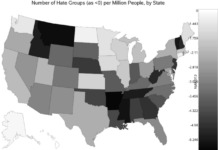Asylum seekers are not the only ones being detained at the U.S.-Mexico Southern border.
Customs are Border Patrol (CBP) officers have now trained their attention on journalists, lawyers, and activists.
According to documents NBC KNSD-TV obtained, CBP has a list of 59 individuals, mostly Americans, intended to be stopped and questioned at San Diego-area checkpoints.
Every individual on the “San Diego Sector Foreign Operations Branch: Migrant Caravan FY-2019 Suspected Organizers, Coordinators, Instigators, and Media” list is being detained for meeting with or aiding asylum seekers from the Honduran caravan on the Mexican side of the border.
At least 21 have been arrested.

Citing an ongoing “national security” investigation, CBP reports 10 journalists–seven of whom are American citizens–a U.S.-based attorney, and others dubbed organizers and “instigators,” of whom 31 are Americans, were present during a violent incident at the San Ysidro Port of Entry border with Tijuana on November 25, which started when some asylum seekers attempted to rush the border checkpoint or climb over the barrier after being made to wait a long time for processing.
CPB responded with tear gas, which Donald Trump later defended as a “minor” form, “very safe.”
Esha Bandhari, staff attorney with the American Civil Liberties Union (ACLU)’s Speech, Privacy and Technology Project, said in a statement:
“This is an outrageous violation of the First Amendment. The government cannot use the pretext of the border to target activists critical of its policies, lawyers providing legal representation, or journalists simply doing their jobs.”
According to the report, CBP demands access to journalists’ phones without warrants, in flagrant violation of the Constitution’s fourth amendment.
One detainee, attorney Nicole Ramos, refugee director for Al Otro Lado, a law center for migrants in Tijuana, Mexico, learned CBP had on her a dossier of information that included personal details like her mother’s name, social media pictures, the car she drives, and her work and travel history.
Ramos explained:
“The document…appears to prove what we have assumed for some time, which is that we are on a law enforcement list designed to retaliate against human rights defenders who work with asylum-seekers and who are critical of CBP practices that violate the rights of asylum seekers.”
Other immigration lawyers who frequently travel to northern Mexico to assist asylum seekers state CPB’s methods are deterring potential future human rights volunteers.
One attorney, speaking upon condition of anonymity, said:
“It has a real chilling effect on people who might go down there. I was going to go this week, but I had to worry about whether I could get back in.”
Other immigration lawyers claim they have even been questioned in locations far from San Diego.
One was accused of being a human trafficker and was released only after data and contacts contained on her phone confirmed otherwise.
Hugh Handeyside, a senior staff attorney at the ACLU’s National Security Project, told The Intercept:
“The government can’t use the border to prevent journalists from gathering information, especially on issues it would rather they not report on. If CBP is interfering with or retaliating against journalists, that raises serious constitutional questions and bears further investigation.”
Sen. Ron Wyden (D-Ore.) agrees, and is investigating the matter.
He reported to The Intercept:
“These are extremely disturbing reports. It would be an outrageous abuse of power for the Trump Administration and CBP to target people for searches based on their political beliefs or because they are journalists. CBP needs to explain exactly what happened in these cases, and whether this was an aberration, or a coordinated effort to punish political opponents.”
This is not the first time journalists were harassed under the current administration.
In November 2017, a trial began for six defendants falsely accused of rioting during Donald Trump’s inauguration, facing up to 70 years in prison had they been convicted.
After nearly a month, they were acquitted of all charges.
2018 was an historic year in which 53 journalists were killed throughout the world.
According to a report from the Committee to Protect Journalists (CPJ):
“The number of journalists targeted for murder in reprisal for their reporting nearly doubled in 2018 from a year earlier, driving up the overall count of journalists killed on the job. Afghanistan, where extremists have stepped up deliberate attacks on journalists, was the deadliest country and accounted for much of the increase.”
From January 1 to Dec. 14, 2018, 34 journalists were killed in retaliation for their articles and investigative reporting, nearly double those killed for the same reason last year. Nearly two-thirds were killed for covering politics.
Referring to the brutal death and dismemberment of Saudi journalist and American resident Jamal Khashoggi in the Saudi consulate in Istanbul, Turkey on October 2, and Donald Trump’s defense of Saudi Arabia, the CPJ reports:
“Essentially, Trump signaled that countries that do enough business with the United States are free to murder journalists without consequence.”
Image credit: KNSD





